Contents
- Division of Phylogenetics and Comparative Biology: Newsletter Spring 2020
- Message from the Chair, David Blackburn, Chair.DPCB@sicb.org
- Message from the Secretary, Haley O’Brien, Secretary.DPCB@sicb.org
- Message from the Program Officer, Todd Oakley, DPO.DPCB@sicb.org
- Message from the Program Officer-Elect, Leigha Lynch
- Message from the Student/Postdoctoral Affairs Committee Representative, Emily Lessner
- DPCB Best Student Presentation Awards
- DPCB Chair-Elect Candidate Biographies
- DPCB Secretary-Elect Candidate Biography
Division of Phylogenetics and Comparative Biology: Newsletter Spring 2020
Please vote in the Spring 2020 Elections (candidate biographies can be found below). The deadline is April 19th, and the ballot can be found in the link provided here. http://burkclients.com/sicb/elections/2020.php
Message from the Chair, David Blackburn, Chair.DPCB@sicb.org
The Division of Phylogenetic and Comparative Biology had a strong presence at this year’s annual meeting in Austin. We had a great line-up of talks and posters for the Wake Award competition (including an unprecedented tie for Wake Award oral presentations!), a successful reprise of the Ask-An-Expert booth, and one of the best attended business meetings for the division in my memory. Thanks especially to our new secretary Haley O’Brien for putting the Ask-An-Expert Booth together! We are pleased to welcome two new members of the DPCB Executive Committee: Program Officer-Elect Dr. Leigha Lynch, and Student and Postdoctoral Affairs Committee Representative Emily Lessner. Leigha specializes in genetics, ancient DNA extraction and sequencing, and phylogenetic comparative methods. Emily is a Ph.D. student studying the trigeminal nerve in Casey Holliday’s lab at the University of Missouri.
In the past few years, we have experienced persistent problems related to confusion between DPCB and DCPB (Division of Comparative Physiology and Biochemistry). We may move this year to revise our divisional name to cause less confusion within SICB but still retain a name that reflects the division’s identity. Stay tuned, but until then, remember: P’s Before B’s When You’re Working With Trees!
This spring, we are voting on a Chair-Elect and a Secretary-Elect for DPCB. Please vote!
Message from the Secretary, Haley O’Brien, Secretary.DPCB@sicb.org
SICB 2020 saw a lot of great momentum for the Division of Phylogenetics and Comparative Biology. The Wake Awards had more participants than the past 5 years, and showcased some stellar student work, which made for difficult decisions by the judges. The 2020 DPCB-sponsored and organized Ask-An-Expert Booth was a great hit! Please join me in thanking Vikram Baliga, Ryan Felice, Sarah Friedman, Anthony Gilbert, Jaimi Gray, Jennifer Hodge, Emily Kane, Kevin Kocot, Olivier Larouche, Leigha Lynch, Don Miles, Sam Price, Lars Schmitz, and Vanessa Young. They provided Expert advice about comparative methods, R-stats, genomics, trait evolution, early career survival, and biomechanics to more than 50 SICB members! The Expert Booth was always crowded, so we are looking to expand our efforts for 2021. Interested in adding more outreach and networking opportunities to your CV? Reach out to any of the DPCB Officers for more information about volunteering at the booth next year in Washington, D.C.
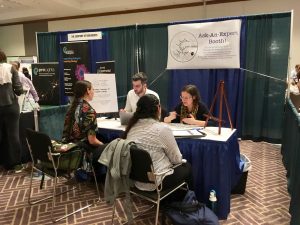
We’re continuing our efforts to overhaul the DPCB Researchers Database (http://bit.ly/DPCBresearchers) this year. This page hosts images and short paragraphs highlighting the work of our members, and is an excellent opportunity to share your interests and recruit students. Students are also encouraged to submit short biographies to showcase their research and future goals.
Want more SICB DPCB updates? Of course you do! Follow us on Twitter for division news, job postings, coding pro-tips, relentless promotion of our awesome members, and probably a few cat videos: @sicb_dpcb
Message from the Program Officer, Todd Oakley, DPO.DPCB@sicb.org
DPCB supports the use of phylogenetic methods to address comparative and integrative questions and supported multiple symposia during the 2020 SICB meeting in Austin, including:
- Reproduction: the female perspective from an integrative and comparative framework
- Building Bridges from Genome to Phenome: Molecules, Methods and Models
- Melding Modeling and Morphology: integrating approaches to understand the evolution of form and function
- Integrative comparative cognition: can neurobiology and neurogenomics inform comparative analyses of cognitive phenotype?
In Washington, D.C. in 2021, we will be co-sponsoring 4 symposia. More information will be posted on SICB’s Washington DC meeting webpage soon.
Message from the Program Officer-Elect, Leigha Lynch
I am excited to have begun my position as DPCB Program-Officer Elect, as of the close of the meeting in Austin! During this year-in-training, I will be working closely with current Program Officer Todd Oakley to recruit DPCB-led symposia. Now is the time to submit your symposium ideas for SICB’s Annual meeting in 2022 in Phoenix, Arizona. Submissions will be due toward the end of August, 2020. Please reach out to myself and Todd if you have ideas! We are particularly interested in symposia that highlight how the methods used by DPCB members (phylogenies, comparative methods) can be used to synthesize research with other exemplar divisions. Possible topics include:
- The latest phylogenetic comparative methods
- New methods for calculating evolutionary rates
- Bioinformatics: best practices and applications
- Phylogenetic methods for modeling evolutionary and ecological processes
- The generation of biological novelty
I’m looking forward to working with DPCB members to highlight our division and its unifying themes across SICB!
Message from the Student/Postdoctoral Affairs Committee Representative, Emily Lessner
Hello, I am Emily Lessner, your new student/post-doc representative! I am currently a PhD candidate in my third year at the University of Missouri working with Casey Holliday. I am investigating the innervation, anatomy, and evolution of trigeminal nerve-innervated sensory systems in reptiles to predict behaviors and interactions of extinct animals. I use dissection and imaging techniques (e.g., whole mount staining, histology, CT scanning) to look inside the skulls of both extant and extinct animals across clades. I first attended SICB as an undergraduate in 2016 and was impressed by the emphasis on diversity, both scientific and demographic. This inspired me to become more involved, and this year I accepted the role as DPCB SPDAC representative and was also a Code of Conduct Safety Ally. I am excited to serve as a DPCB representative and please don’t hesitate to contact me with concerns, questions, or comments!
SPDAC report: The SPDAC “How-To?” booth was a success this year and we have decided to hold it again next year. In Washington D.C., we will be continuing to distribute packets and brochures on various topics (e.g., tips for media interviews, research and teaching statements, elevator talks, how to get a post-doc, etc.). We will be adding more literature (contact me with any ideas at ejlessner@mail.missouri.edu) and a schedule of relevant events and holding office hours with the representatives for in person divisional-specific questions and concerns.
The Transitions in Science Careers Workshop was also a success, with over 60 attendees and 10 unique topics for discussion! We are planning a similar event for Washington D.C., this time focusing on “Transferable Skills in Academia and Non-Academia.” Our goal is to invite external experts in governmental, contracting, museum, and other careers in addition to our SICB members from academia to speak about their experiences. Please let me know if you have potential contacts or any suggestions.
Thank you to the non-SPDAC members who attended our meeting at SICB. Your comments were heard and appreciated!
DPCB Best Student Presentation Awards
Winners of the Wake Award for Best Student Oral Presentation:

- Katherine Corn, UC Davis: Katherine Corn is a fourth-year PhD candidate in the Wainwright Lab at UC Davis. Her interests center around the relationship between functional morphology and macroevolution, specifically the role of major functional transitions in driving and constraining morphological diversity. Her goals are to continue to explore the diversity of fishes and the fish feeding apparatus as a professor.
-
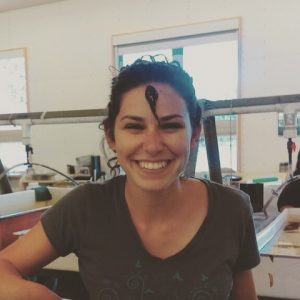
Sarah Friedman Sarah Friedman, UC Davis: “I am a 5th year in the Ecology program at UC Davis. As a Ph.D. candidate in Peter Wainwright’s lab, my work combines aspects of phylogenetic comparative methods, functional morphology, and biomechanics to determine the ecological mechanisms that shape the evolution and diversification of fishes. After completing my dissertation, I’m hoping to continue my work in macroevolution and functional morphology as a postdoc and ultimately run my own lab as a tenure-track professo
Winner of the Wake Award for Best Student Poster Presentation: Natasha Picciani, UC Santa Barbara. Natasha Picciani is an evolutionary biologist using phylogenetics, single cell techniques, and other comparative approaches to
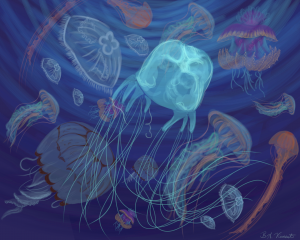
understand convergence of complex traits. Her focus is the evolution of eyes and photoreceptor cells in Cnidaria, including jellyfish with eyes that evolved repeatedly. Natasha is in the final year of the PhD program in Ecology, Evolution and Marine Biology at the University of California, Santa Barbara, where she works with Prof. Todd Oakley’s research group. She was recently awarded the Donnelley Postdoctoral Environmental Fellowship at Yale University to continue investigating the evolution of complexity and its molecular basis in the laboratory of Prof. Casey Dunn.
Wake Award BSP Poster Honorable Mention: Shannon Dohr for Dohr, SD*; Hahn, KM; Tuffield, MS; Ward, RS; Boyer, SL. New species of New Zealand Mite Harvestmen in the Genus Aoraki (Arachnida, Opiliones, Cyphophthalmi, Pettalidae). Presenting Author Shannon Dohr is a junior biology major, data science and spanish double minor at Macalester College. After graduation, she plans to join Americorps and apply to graduate school to study microbiology.
DPCB Chair-Elect Candidate Biographies
(Ballot: http://burkclients.com/sicb/elections/2020.php)
Samantha Price
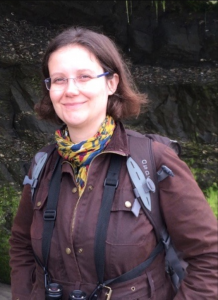
Current Position: Assistant Professor in the Department of Biological Sciences at Clemson University
Education: BA (2001) University of Oxford; Ph.D. (2006) University of Virginia; Postdoctoral Fellow (2005–2008) Duke University; Postdoctoral Researcher (2008–2011) UC Davis
Research Interests: My research uses phylogenetic comparative approaches to investigate how the biotic and abiotic environment regulates the evolution of ecomorphological diversity. Central to my research is the generation and analysis of vast ecomorphological databases based on museum specimens. Taking morphometric measurements and geometric morphometric descriptions of functionally relevant structures enables me to integrate fossil and living diversity when applicable. My aim is to identify repeating themes and general principles governing the evolution of vertebrate biodiversity.
SICB Activities: I have been an active member of the Division of Phylogenetic and Comparative Biology since joining SICB in 2008. I have taught at several phylogenetic comparative workshops supported by the division and in 2019 and 2020 I volunteered to be part of the DPCB “Ask an Expert Booth”. I also co-organized with Dr. Martha Muñoz a SICB-Wide symposium on “Comparative Evolutionary Morphology and Biomechanics in the Era of Big Data,” along with the accompanying student mentorship luncheon. I have also served the broader community of comparative biologists by teaching hands-on phylogenetic comparative method workshops in the US (as a guest instructor at the Bodega Bay Applied Phylogenetic workshop 2008 to 2017 & the Friday Harbor Evolutionary Quantitative Genetics Workshop 2019 & 2020) and Chile (3-day courses in Concepción 2015 & Santiago 2016).
Goals Statement: My primary goal as Chair would be to promote and advocate for the Division within the Society for Integrative and Comparative Biology and beyond, to attract new active members that share our interests in phylogenetic and comparative biology. I would work with the other officers of the division to build upon recent initiatives, such as the popular “Ask an Expert” booth, to support the application of phylogenetic approaches society-wide. For example, running a series of practical methods workshops each tied to a symposium that is co-organized with another SICB division. I would also solicit feedback from our members to identify new ways to engage and further support our graduate student and postdoctoral members, whose innovative research is the best advertisement we have for our division.
Haley D. O’Brien
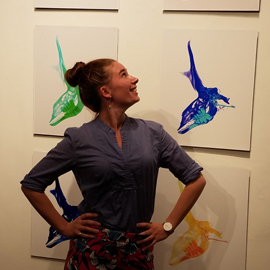
Current Position: Assistant Professor, Oklahoma State University Center for Health Sciences
Education: Ph.D., Ohio University, 2016; B.S., College of Charleston, 2009.
Research Interests: My research focuses on the role that unique thermoregulatory capabilities have played in the evolution of large-bodied mammals across periods of Cenozoic climate change. I use selective brain cooling in artiodactyls and carnivores as a model system, and employ macroevolutionary modeling and phylogenetic comparative methods to generate inferences regarding the interface between organismal physiology and environmental shifts across deep time scales.
SICB Activities: SICB is a great society to be involved in, and I have enjoyed my time as the Secretary of the Division of Phylogenetics and Comparative Biology since 2018. I also started and continue organizing the Ask-An-Expert Booth, have participated in symposia, contributed manuscripts to Integrative and Comparative Biology and Integrative Organismal Biology, and play an active role in SICB mentorship opportunities, such as the Broadening Participation Committee Mentorship Program.
Goals Statement: My goal is to help increase the visibility of the Division of Phylogenetics and Comparative Biology. As secretary, I have increased DPCB’s activity on social media and organized the Ask-An-Expert Booth. I have also been recruiting materials for the SICB Research and Education Resources database and have been working with the Webmaster to include systematics and phylogenetic comparative methods as a separate page. Currently, DPCB has a lot of forward momentum, and I hope to capitalize on that by continuing the highly visible projects that I have started and by soliciting DPCB-led symposia at upcoming meetings. Hashtag please vote for Sam Price.
DPCB Secretary-Elect Candidate Biography
(Ballot: http://burkclients.com/sicb/elections/2020.php)
Ryan N. Felice
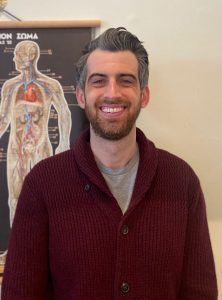
Current Position: Lecturer, University College London, London, UK
Education: Ph.D., Ohio University, 2015; B.S., Tulane University, 2009
Research Interests: My research is focused on the evolution of morphological diversity through time. I use geometric morphometrics and phylogenetic comparative methods to understand how the component parts of organisms relate to one another (i.e., modularity and integration) and how these interactions have shaped evolvability, disparity, and variation across the tree of life. Working primarily on birds, dinosaurs, and other archosaurs, I am interested in bridging macroevolution with developmental biology to understand the factors that constrain and/or facilitate skeletal evolution. I am also interested in developing and refining new methods for high-dimensional characterization of shape, working toward the goal of characterizing the “phenome”- the sum total of phenotypic traits of an organism.
Goals Statement: To me, phylogenetics and comparative biology represents the heart of SICB. Nearly every other division has members that use phylogenetic and comparative methods in their research. Spreading this message and raising awareness of our division to increase our membership is my goal as Secretary. DPCB has made great strides in this direction in two ways: (1) fantastic Wake Award sessions for best student talk with packed audiences and (2) the “Ask an Expert” booth. In my tenure as secretary, I plan to help in fostering the success of these events to enhance engagement with DPCB. I will further increase awareness and engagement by partnering with the rest of the DPCB officers to sponsor and organize multiple symposia.
